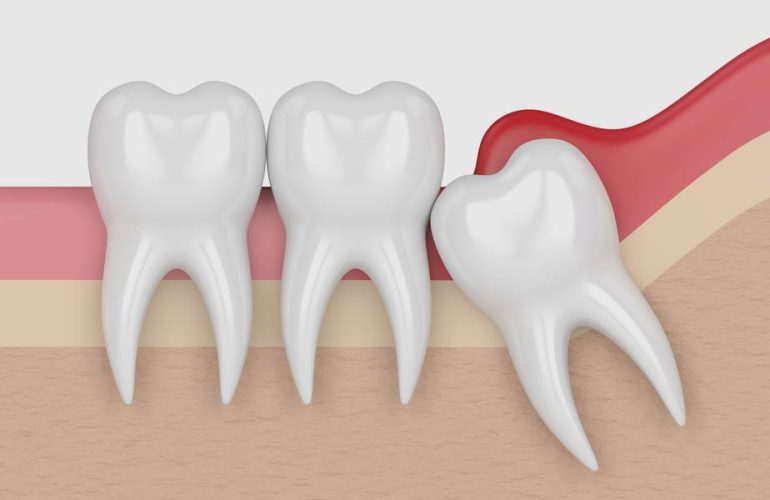
What Are Wisdom Teeth?
Wisdom teeth are the four molars located furthest back in the mouth. They usually begin to emerge between the ages of 17 and 25, although some people may not develop them at all. These teeth were once essential for our ancestors, who had a diet that required more chewing power. However, as our diets have evolved and our jaw sizes have reduced, wisdom teeth are now often more trouble than they’re worth.
Why Do We Have Wisdom Teeth?
In the past, wisdom teeth helped early humans process tough plant material and raw meats. Nowadays, they are largely vestigial, meaning they are no longer necessary for proper chewing. Many people’s mouths simply don’t have enough space to accommodate them, leading to various dental problems.
While not everyone experiences issues, wisdom teeth can often cause complications such as:
Impaction – When there isn’t enough space for a wisdom tooth to grow properly, it may become impacted. This can lead to the tooth growing sideways, pushing against neighboring teeth, or becoming partially or fully trapped under the gums.
Infection and Gum Disease – Impacted or partially erupted wisdom teeth are hard to clean properly. Food and bacteria can get trapped around them, increasing the risk of infection and gum disease.
Crowding – When wisdom teeth emerge, they can push against adjacent teeth, causing misalignment or overcrowding, which may necessitate orthodontic treatment.
Cysts and Damage to Neighboring Teeth – In some cases, a cyst can form around an impacted wisdom tooth, potentially damaging nearby teeth and bone structures.
Wisdom teeth are not always problematic, but in many cases, they need to be removed. Here are some reasons why extraction might be necessary:
Lack of Space – If there isn’t enough room in the mouth to accommodate the wisdom teeth, they can become impacted. In these cases, the wisdom tooth might grow sideways or become stuck beneath the gum line.
Impacted Wisdom Teeth – When a tooth grows at an angle or gets trapped under the gums, it can push against neighboring teeth, leading to pain and potential damage. This is one of the most common reasons for wisdom tooth removal.
If problematic wisdom teeth are left untreated, they can lead to a variety of dental issues:
Infection and Pain – Impacted wisdom teeth are difficult to clean properly, leading to a buildup of bacteria and food particles. This can result in infections, which cause pain, swelling, and even the formation of abscesses.
Gum Disease – Infections around impacted wisdom teeth can lead to gum disease, which can spread to other teeth if left untreated.
Damage to Adjacent Teeth – An impacted wisdom tooth can exert pressure on nearby teeth, causing misalignment, root damage, or even tooth loss in severe cases.
If your dentist recommends wisdom tooth removal, the procedure is generally quick and straightforward. Here’s what typically happens:
Anesthesia – Local or general anesthesia will be used to ensure you’re comfortable during the procedure.
Extraction – The dentist or oral surgeon will make an incision in the gums if necessary to access the impacted teeth. If the tooth is deeply embedded, it may be broken into smaller pieces for easier removal.
Recovery – After the extraction, there may be some swelling and discomfort. Recovery usually takes a few days, during which you’ll need to follow care instructions to prevent complications such as dry socket or infection.
After the removal of wisdom teeth, here are some tips for a smooth recovery:
Rest – Avoid strenuous activities for 24-48 hours to help with healing.
Diet – Stick to soft foods and avoid anything that could irritate the healing area, like spicy, hard, or hot foods.
Pain Management – Use prescribed or over-the-counter medications as recommended by your dentist to manage pain.
Oral Hygiene – Be gentle when brushing and flossing near the extraction sites. Avoid using straws, as this can dislodge blood clots and slow the healing process.
As always, maintaining good oral hygiene is key to avoiding complications with your wisdom teeth. Even though they are located at the back of the mouth and can be difficult to reach, it’s important to floss and brush properly around these teeth to keep bacteria at bay.
Regular check-ups with your dentist, including routine X-rays, are essential for monitoring the development of your wisdom teeth. X-rays will help determine whether they are growing in properly or if they could become problematic in the future.
While wisdom teeth aren’t necessary for modern life, they can cause discomfort, infection, and alignment issues if they don’t grow in properly. If you experience pain or complications, consult with your dentist to determine whether extraction is the best course of action. Early intervention can prevent more serious issues down the line and promote a smoother recovery.
Wisdom teeth can cause discomfort and complications if not properly managed. Learn what you need to know about their development, potential problems, and treatment options. Visit Dentistry on Ellesmere for expert advice and care regarding your wisdom teeth. Book your consultation today!
Mon & Wed: 9 AM - 7 PM
Tue: 9 AM - 6 PM
Thu, Fri & Sat : 8:30 AM - 2:30 PM
Sun: Closed
880 Ellesmere Rd #103
Scarborough, ON M1P 2W6
647-265-1413
dentistryonellesmere@rogers.com